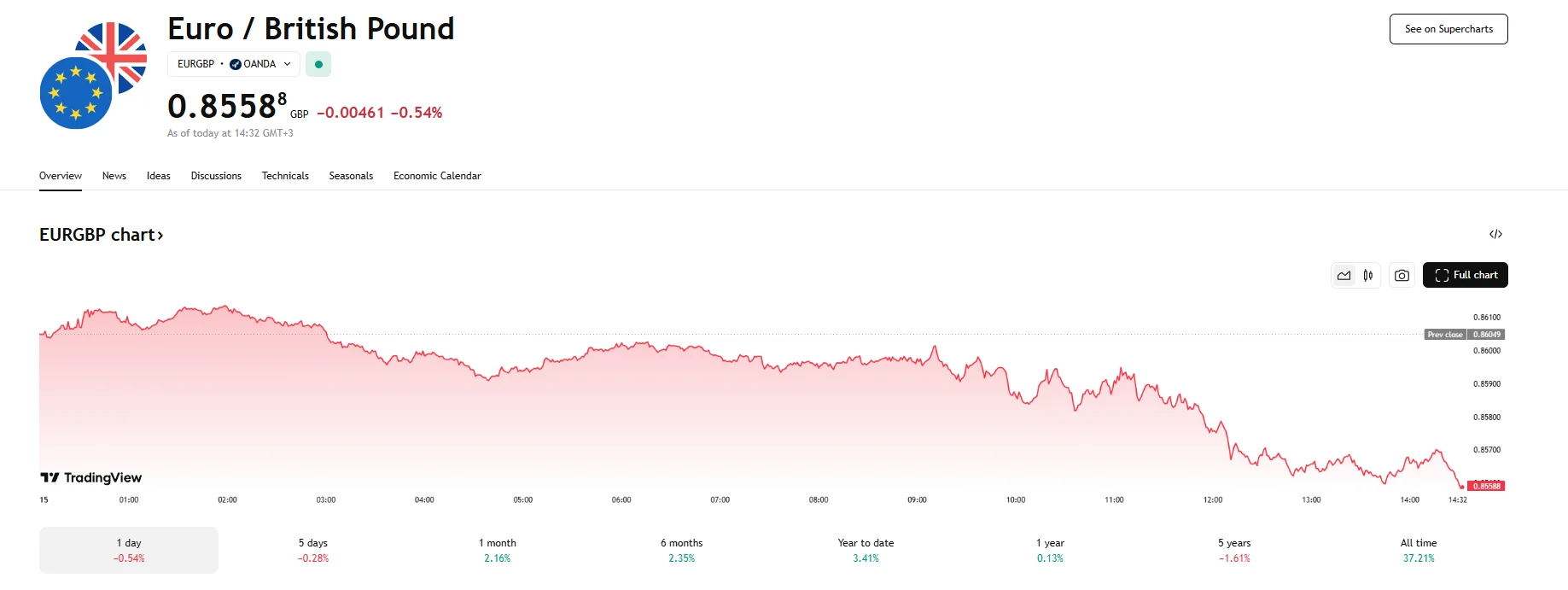EUR/GBP Down 0.54% to 0.8558, UK Wage Growth at Nearly 6% EUR/GBP Down 0.54% to 0.8558, UK Wage Growth at Nearly 6%
Key momentsThe EUR/GBP fell 0.54% to 0.8558 on Tuesday.Figures released by the ONS provided fresh insights into the state of employment within the UK economy, with vacancy reducing to a notable extent
Key moments
- The EUR/GBP fell 0.54% to 0.8558 on Tuesday.
- Figures released by the ONS provided fresh insights into the state of employment within the UK economy, with vacancy reducing to a notable extent while wages saw an increase.
- Analysts expect the BoE will cut interest rates later this year.
EUR/GBP Loses Ground on Heels of Promising UK Wage Figures and Strong Sterling
Tuesday’s trading session witnessed a decline in the EUR/GBP exchange rate, with the pairing falling by 0.54% to 0.8558 as the British pound demonstrated strength against the euro. This downward movement for the euro against the sterling followed the release of data concerning the United Kingdom’s labor market, compiled by the Office for National Statistics (ONS).

The ONS revealed a nuanced picture of the UK labor market in the period leading up to an impending increase in employer taxes this month. While the unemployment rate remained stable, a notable development was a decrease in job vacancies, with the figure reaching its lowest point in nearly four years. This suggests a potential cooling in demand for labor, marking a significant shift as vacancies dipped below levels not seen since prior to the COVID-19 pandemic.
A key element that appeared to be supporting the pound’s strength was the persistent robustness of wage growth. Regular pay increased 5.9% year-on-year in the three months leading up to February 2025, just beating the forecasted 5.8%. Public sector wages rose 5.7%, while those employed in the private sector saw their wages climb 5.9%.
Growing risk appetite may have also played a role, as ING’s Francesco Pesole has noted that the pound’s recent recovery against the euro appears to be primarily driven by broader risk sentiment and ongoing uncertainty surrounding US tariffs. He suggested that the euro, often perceived as a safe-haven currency, tends to gain against sterling during periods of heightened risk aversion. However, in the near term, he anticipates a potential further decline in the EUR/GBP pair.
This combination of a potentially softening jobs market, indicated by falling vacancies, alongside strong wage growth, presents a complex scenario for the Bank of England (BoE). Analysts at BBVA suggested that while the strong wage growth might warrant an especially cautious approach towards interest rates, nothing in the report suggested a deviation from a gradual path of interest rate reductions. This perspective indicates a belief that the BoE will likely proceed with its anticipated rate cuts despite the wage data.
Disclaimer: The views in this article are from the original Creator and do not represent the views or position of Hawk Insight. The content of the article is for reference, communication and learning only, and does not constitute investment advice. If it involves copyright issues, please contact us for deletion.